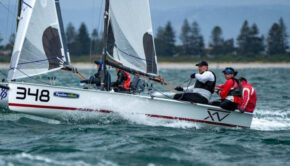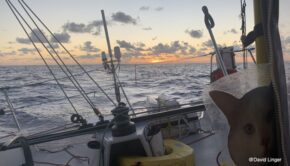Meal planning for racing around world
Published on December 9th, 2022
The inaugural Global Solo Challenge 2023-24 seeks to be a budget-friendly solo, non-stop race around the world. For boats from 32 to 55 feet with an IRC rating below 1.370, a pursuit start over 11 weeks begins in A Coruña, Spain, with the first boat to return deemed the winner.
In this report by Dave Proctor, he ponders the process of organizing meals for the race.
Imagine planning your menu for the next 120-240 days, breakfast, lunch, and dinner. Whilst there are no set rules, there are some primary considerations.
Weight and size are the first. During the voyage, they will not have access to fresh produce and the full range of foods that are essential to maintain good health, so supplements will be required, particularly Vitamin C (remember that a lack of this Vitamin causes scurvy, which caused the deaths of many, many sailors in bygone eras).
They will also have to factor in that during their time in the cold southern oceans, they will be using a lot more calories than usual.
Normally, a healthy male will use about 2,500 calories per day (for females about 2,000). In the cold, and where the sailors will face physically demanding sailing, then the calorie requirement could easily surpass 4,500 calories per day, though it should be remembered that for the rest of the voyage, when sailing in more pleasant temperatures, the body will only require it’s ‘normal’ level of calories.
Many skippers will take advice from a nutritionist, who will help them plan a healthy diet for the voyage, but within this, there are different approaches and considerations.
We can go back and look at Sir Robin Knox-Johnston’s diet, but have to remember food technology has advanced considerably since that time. His food supply mainly came from tins, and it has been widely reported that when he set off on his yacht, Suhaili, it was literally laden to the gunwales with tins of food, together with his rations of booze.
Indeed, Sir Robin’s favorite dish was the ‘Suhaili’ stew, which comprised a tin of meat, a tin of vegetables, a tin of potatoes, and a stock cube all cooked together in a pot.
As a more up-to-date contrast, we can compare the diets of two Hall of Fame inductees of the International Association of Cape Horners.
The first is the diet of veteran sailor Jon Sanders, who has circumnavigated the Globe 11 times. His simple provisions for these voyages were powdered milk and egg, tinned fruit, meatballs, rice, Nescafé instant coffee, and of course being Australian, Vegemite.
However, at the other end of the scale, look at the diet of Frenchman, Jean-Luc Van Den Heede who employed the use of a dietician and came up with a menu plan where he never had more than ten meals of any particular dish (planning for 250 days at sea).
He had, amongst his three meals per day, tempting dishes such as pheasant terrine, camembert cheese, gourmet foods from the Comtess du Barry range (a French delicatessen), fresh bread cooked on board and, naturally, he accompanied each meal with a glass of wine.
Generally, carbohydrate-rich staples like rice, pasta, and dried noodles will form a part of many skippers’ diets and these can be made into a wholesome and tasty meal with some simple additional ingredients.
Food technology is an evolving science, and nowadays sailors also have the choice of using freeze-dried food where the water is removed from the food by sublimation. To rehydrate the foodstuff, you generally just add boiling water. These products generally have a long shelf life, are light in weight, quick to make, easy to handle and apparently, taste fairly good.
However, the skippers do need to be careful in preparing freeze-dried food. In the 2007-08 Volvo Ocean Race, two sailors suffered serious stomach problems. This was diagnosed as a blockage in their digestive systems, probably caused by freeze-dried food that had not been properly rehydrated. This condition could have proved fatal if they not have received urgent treatment.
These products should not be confused with dehydrated noodle-type snacks, which given their salt, fat and additive content could not reasonably be considered a part of a healthy long-term diet.
An alternative to this is apertized (or sometimes called sterilized) foods, which uses the traditional method of packing food in glass bottles, it is cooked and then sterilized at high temperatures for a certain amount of time, thus extending the shelf life to between one and up to six years. Such foods are generally available in wet pouches, which are heated, either in a microwave or by immersion in boiling water.
These ‘wet meals’ as they are termed, are even available in self-heating bags, where the contents are heated by way of an exothermic chemical reaction, which is contained within the packaging.
One further development is a range of foods which have been specifically developed for offshore racers. These foods do not contain any salt, so that seawater can be used to rehydrate the food, thus reducing the amount of water that has to be carried on board and/or the use of a water desalinator.
The other consideration for any skipper, is whether they permit themself to have alcoholic drinks on board. The founder of the GSC Marco Nannini says that he will always have a dry ship, whilst Jean-Luc Van Den Heede, Sir Robin Knox-Johnston, and Sir Francis Chichester would disagree.
Indeed, Sir Francis once reportedly said that his mood was at its lowest ebb the day he ran out of gin, which was on the final stage of his circumnavigation.
GSC entrant Daffyd Hughes, states that he will obviously be taking a few tins of beer brewed by his sponsor, the Quantock Brewery. He will also be taking a bottle of spirit, as he is of the opinion that if he does not have something like that on board then he will crave it, though he points out that he may well not open it.
Hughes, again, will for the most part rely on freeze-dried foods, but this will be supplemented by biltong, dried fruit, and nuts, and cans of curry, as a special treat. He also proudly boasts of his own recipe for suet and currant pudding, which he cooks in his pressure cooker. An ideal heavy pudding that will warm him and put a smile on his face, even in the worst of weather.
One final point that the skippers who are planning their departures in the GSC should remember, is that food can be a psychological comfort and a repetitive diet with no treats or anything to look forward to, could really affect morale.









 We’ll keep your information safe.
We’ll keep your information safe.